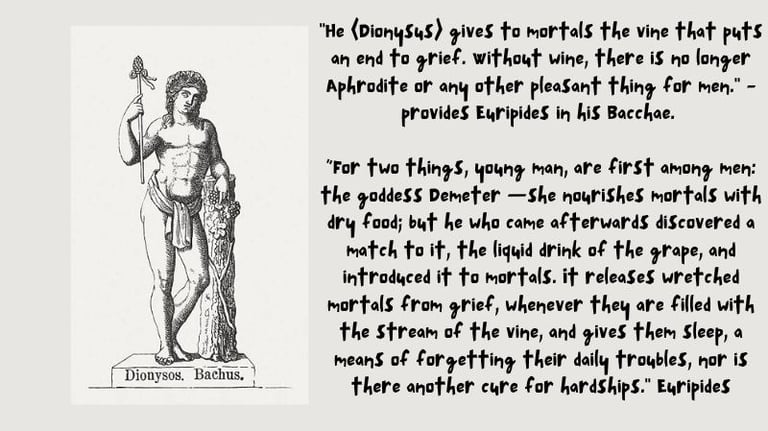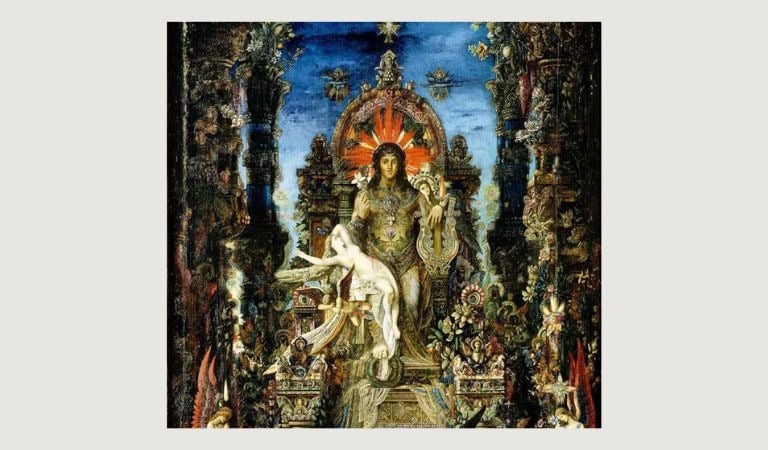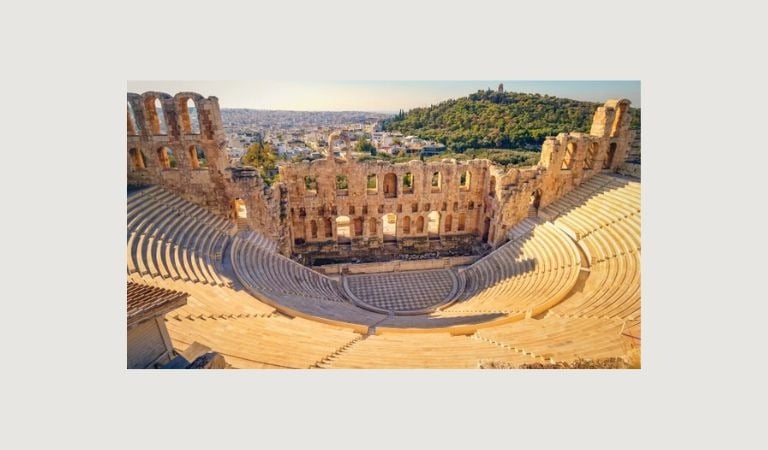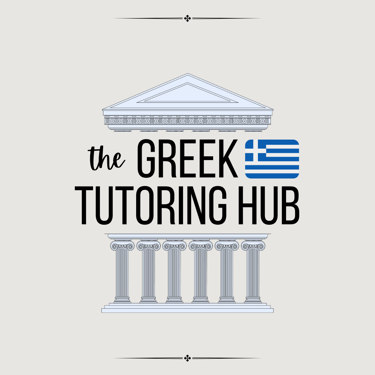Dionysus: Greek God of Wine, Festivity, and Theatre
In this post, we are exploring some facts about Dionysus, the Greek God of Wine and Festivity! If you are a Greek Mythology enthusiast then this article will enhance your knowledge!
7/30/20245 min read
Meet Dionysus:
The Enigmatic Greek God of Wine, Festivity, and Theatre
Dionysus, (Greek name: Διόνυσος) known to the Romans as Bacchus, is one of the most intriguing and multifaceted deities in Greek mythology. Revered as the god of wine, festivity, and theatre, Dionysus embodies both the joy and the chaos of life, making him a complex and captivating figure.


Origins and Birth
Dionysus's origins are as mysterious as the god himself.
He is the son of Zeus, the king of the gods, and Semele, a mortal princess. The circumstances of his birth are unusual and dramatic.
Semele, tricked by the jealous Hera, asked to see Zeus in his true form. Unable to refuse, Zeus revealed himself, and the sight of his divine form was too much for the mortal Semele, who perished in the blaze. Zeus managed to save the unborn Dionysus by sewing him into his thigh until he was ready to be born. This miraculous birth earned Dionysus the epithet “twice-born.”
Symbols and Attributes
Dionysus is often depicted with symbols that reflect his domains and character. The grapevine and ivy are among his most recognisable symbols, representing his association with wine and revelry.
The thyrsus, a staff topped with a pinecone and entwined with ivy, is another symbol closely associated with him, symbolising prosperity, pleasure, and hedonism. His sacred animals include the leopard and the goat, both representing his wild and untamed nature.
The duality of Dionysus
Perhaps one of the most fascinating aspects of Dionysus is his dual nature. According to his mythological descriptions, he embodies both the ecstatic joy and the destructive chaos that come with intoxication and revelry. This duality is reflected in his followers, the Maenads (or Bacchae) Μενάδες (ή Βάκχες), who were known for their frenzied, ecstatic worship practices.
The duality also extends to Dionysus’s impact on society: he is a bringer of joy and liberation but also of madness and disorder. This complex nature made him a god who could be both loved and feared.
Myths and Legends
Dionysus’s mythological stories are as varied as his nature. One well-known myth is his capture by pirates. The pirates, not realising they had captured a god, tried to bind him, but the ropes would not hold. Dionysus transformed the ship into a vessel covered in vines and filled with wild animals, driving the pirates into the sea, where they were turned into dolphins.
Another significant myth involves his journey to the underworld to rescue his mother, Semele. Demonstrating his power and determination, Dionysus braved the realm of the dead and successfully brought Semele back to life, granting her immortality on Mount Olympus.


Cult and Worship
The worship of Dionysus was widespread and varied across the ancient Greek world.
His followers celebrated him with festivals such as the Dionysia (Διονύσια), which included dramatic performances that gave rise to Greek theatre.
The rural Dionysia, marked by processions and feasting, and the city Dionysia, known for its theatrical competitions, were key events in the Athenian calendar. These festivals were not only religious observances but also significant cultural and social gatherings.
Dionysus and Theatre
Dionysus’s association with theatre is one of his most enduring legacies. As the god of theatre, he was believed to inspire the dramatic arts.
The theatre of Dionysus in Athens, one of the oldest theatres in the world, was dedicated to him and hosted performances of tragedies and comedies.
The themes of transformation and liberation central to Dionysus’s character are echoed in the transformative nature of theatre, where actors take on different roles and audiences experience catharsis.


Dionysus and the Greek Language
The influence of Dionysus extends beyond mythology and culture into the very fabric of the Greek language itself.
The stories and worship of Dionysus have contributed significantly to the Greek vocabulary and expressions, enriching the language with terms and concepts that are still relevant today.
One notable contribution is the term “Dionysian” (Διονυσιακός) derived from the God’s name. This adjective describes anything pertaining to the wild, ecstatic, and liberating aspects of Dionysus’s character and worship. It is often used in contrast to “Apollonian” (Απολλώνιος), which represents order, rationality, and restraint, drawing on the characteristics of Apollo. This dichotomy between Dionysian and Apollonian reflects the balance of chaos and order in human nature and is a concept explored in philosophy, literature, and art.
The rituals and festivals dedicated to Dionysus also contributed to the development of Greek theatre, a cornerstone of Greek language and culture. The term “thespian”, used to describe actors, originates from Thespis, who is considered the first actor in Greek drama and who performed in Dionysian festivals. These dramatic performances were not just entertainment; they were a form of storytelling that utilised rich, poetic language and dialogue, significantly influencing the evolution of Greek literature and theatre.
The linguistic influence of Dionysus is also evident in the vocabulary associated with wine and viticulture, domains over which he presides.
Terms related to wine production, celebration, and revelry often have roots in the myths and worship practices of Dionysus. For instance, the word “symposium,” which originally meant a drinking party or banquet, is derived from the Greek word “symposion” (συμπόσιον), where participants would engage in philosophical discussions while enjoying wine, an activity often dedicated to Dionysus.
Additionally, the linguistic legacy of Dionysus can be seen in the expressions and idioms that have entered the Greek language.
Phrases that denote celebration, ecstasy, or even madness often have connotations linked to Dionysian worship. This linguistic heritage highlights how deeply Dionysus’s influence permeated daily life and language in ancient Greece.
The integration of Dionysian concepts into the Greek language reflects the profound impact that mythology and religion had on shaping cultural and linguistic identity. Learning Greek allows one to appreciate these connections and understand the subtleties of the language that are deeply intertwined with its mythological roots.
Epilogue
Dionysus, with his intoxicating blend of joy and madness, creativity and chaos, remains one of the most captivating figures in Greek mythology.
His stories and symbols reflect the complexities of human nature and the world around us. Exploring the myths of Dionysus not only offers a glimpse into ancient Greek culture but also provides timeless insights into the human condition.
For those inspired by the rich tapestry of Greek mythology, learning the Greek language can offer a deeper understanding and connection to these timeless stories. At Greek Tutoring Hub, we invite you to embark on this journey with us, delving into the language and lore of ancient Greece.
Through our comprehensive courses, you can uncover the beauty and wisdom of Greek mythology, bringing the stories of gods like Dionysus to life.


#greekmythology
#greekgods
#dionysus
Find us on social media
© 2024. All rights reserved.
Quick Navigation
Information
Join our newsletter and download your free copy of our 'essential greek phrases cheat sheet' !
enquiries: +44 7858 148305
